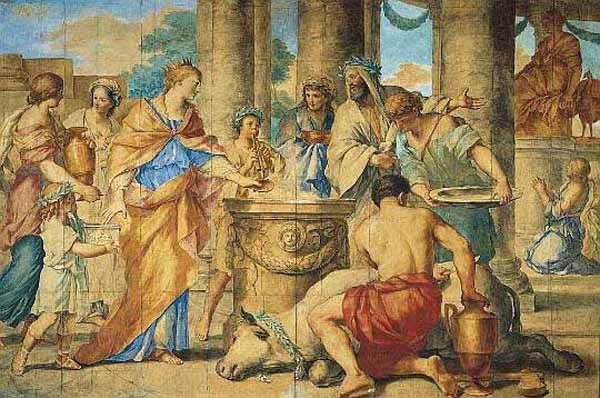Modern Religious Experience: Personal Commemoration- Reflection #7: "Think of an event in your life- past, present or future. You are going to create a commemorative ritual for this event. First, describe the ..."
The event I have picked is called Hajj. It is a future event as I have not performed Hajj as yet. Hajj is an Islamic practice in which a muslim makes pilgrimage to Mecca, Saudi Arabia. It is an obligation on every able-bodied Muslim to do Hajj at least once in their lifetime if they have the financial means to do so. It is the fifth pillar of Islam.
The Hajj occurs from the 8th to the 12th day of the Islamic calendar. The dress code for Hajj is the Ihram for men and hijab and modest dress for women. The Ihram consists of two sheets of white cloth, with the top draped over the torso and the bottom securedd by a white belt or sash. The perpose of Ihram is so that no one is able to differentiate between the rich and the poor in God's house, everyone is equal. For women, the clothing is to cover their entire body and to wear the hijab and to reveal only the hands and the face. When a Muslim wears the Ihram, he/she enters Masjid Al-Haram in the state of Ihram. While in the state of Ihram, a Muslim is not allowed to shave, clip their nails, wear perfume, wear shoes which cover their ankles, swear or quarrel, have sexual relations, uproot or damage plants or any living thing and perform any dishonest acts or carry weapons. Muslim men should not cover their heads and the women should not cover their faces or thier hands.
The Hajj ritual consists of each person walking counter clockwise arround the Kaba seven times, running back and forth between the hills of Al- Safa and Al-Marwah seven times, drinking from the Zamzam well, going to the plains of Mount Arafat to stand in vigil, and throwing stones on a rtual called Stoing of the Devil. The pilgrim then shaves their head(men only), perfrom a ritual of animal sacrifice, and celebrate the three day global festival of Eid Al-Adha. There are many prayers and suplications that a Muslim performs during the Hajj. But the most commen one is the Talbiyah:
Labbaika Allahumma Labbaik,
Labbaik La Shareeka Laka Labbaik,
Innal-Hamda,
Wan-Nematah,
Laka Wal Mulk,
La Shareeka Laka.
Which translates as the following: ''Here I am at thy service O Lord, here I am. Here I am at thy service and tou hast no partners. Thine alone is All praise and All bounty, and Thine alone is the Sovereignty. Thou hast no partners.''
This supplication is recited by Muslims as a conviction of their intention to perform Hajj only for the Glory of God and it is repeatedly invoked during the Hajj so that Muslims can purify themselves and rid themselves of worldly concerns.
After performing Hajj and celebrating Eid Al-Adha, pilgrims before leaving Mecca, perform a farewell tawaf, called the Tawaf-Al-Wida, which means to ''bid farewell''
Sunday, 28 November 2010
Tuesday, 9 November 2010
Modern Religious Experience: The Morality of Greek Myths- Reflection #6

Modern Religious Experience: The Morality of Greek Myths- Reflection #6: "The Creation of Seasons: Demeter and PersephoneFor this reflection, upload a picture that represents your character in the Greek myth you pr..."
The King of the Gods, Jupiter came down to Earth one day to consort with his 3 Nymphs. His wife, Juno, becomes suspicious of his behaviour and wants to investigate. One of the Nymphs, Echo, deceives Juno and helps the Nymphs to escape. Juno curses Echo that from here-forth she would not speak but repeat the words of others.
Narcissies is a charming man who is lost in the woods. Echo tries all ways to please Narcissies, but in vain. Echo ultimately dies repeating her own words. Besides Echo, older Nymphs, prayed to God to punish Narcissies for his selfishness. Nemeses, the Godesses of retribution, punishes him and turns him into a flower, so that he is so annoyed by himself that he could not take his eyes away.
Moral of the Story: Jealousy and Selfishness does not reward anyone in the long-run.
The important virtue of the Greeks, is to punish anyone who does wrong or is of a bad character or is proud.
One should learn from this story, that one should be happy with his surroundings and not be greedy.
The gods were a lot like human beings in how they reacted and had the same kind of emotions as humans, the only thing that made them more superior was their power. They were also able to come down to earth and communicate with the people face to face. The gods were sometimes unjust and did whatever pleased them.
Modern Religious Experience: The Morality of Greek Myths- Reflection #6
Modern Religious Experience: The Morality of Greek Myths- Reflection #6: "The Creation of Seasons: Demeter and PersephoneFor this reflection, upload a picture that represents your character in the Greek myth you pr..."
Subscribe to:
Posts (Atom)